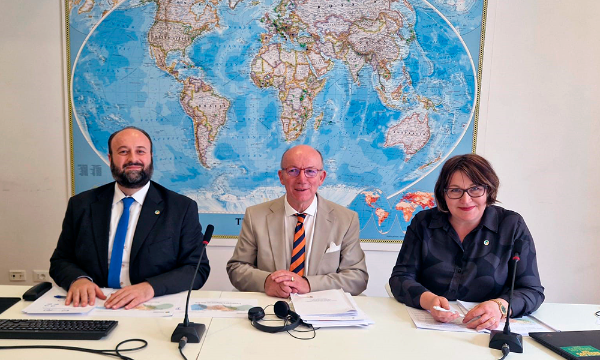Maailman tuottajajärjestö WFO valmiina YK:n ilmastokokoukseen
Uutinen
Maailman tuottajajärjestö WFO valmiina YK:n ilmastokokoukseen
09.10.2023
Maailman tuottajajärjestö WFO on valmistautunut hyvin joulukuun alun COP28-ilmastokokoukseen. Brittien NFU:n Ceris Jonesin vetämä viljelijäedustuksen kokoava ryhmä on valmistellut tilaisuuden juoksutusta ja parin viikon päästä myös viljelijöiden julkilausuma on viljelijäjärjestöjen ennakkovaikuttamiseen käytettävissä. Ilmastokokous on yksi WFO:n foorumi. Seuraavaksi valmistellaan WTO:n MC13-ministerikokouksen ja Saudi-Arabian COP16-biodiversiteettikokouksen viljelijävaikuttavuutta.
Viime perjantaina WFO:n eurooppalaiset jäsenet kokoontuivat hybridikokoukseen MTK:n Brysselin toimistossa. WFO:n johtokunnan eurooppalaisjäsenen Kati Partasen vetämässä kokouksessa pääteemana oli YK:n ilmastokokous Dubaissa. WFO on saanut mahdollisuuden järjestää 75 viljelijäedustajaa paikan päälle. Nyt tavoitteena on ollut saada viljelijäjohtajia yhä enemmän puhumaan kokousedustajien ja viestimien kanssa. Suomesta on paikan päälle lähdössä WFO:n puolelta Kati Partanen ja Katariina Latva sekä Anssi Kainulainen ja Tiina Huvio (FFD).
WFO on organisoinut nyt lisää tukea valmisteluun. NFU:n Ceris Jones on vastannut aikaisemminkin valmistelusta. Nyt sekä WFO:n sihteeristöstä että jäsenorganisaatioista on saatu lisäresursseja viljelijöiden yhteisen äänen valmistelutyöhön.
Ennakkovaikuttamista varten on valmisteltu yhteistä julkilausumaa viljelijäviestiksi kokouksessa. Parin viikon päästä kootaan vielä viimeiset kommentit pohjapaperiin, joka jo nyt on saanut kiitosta eri puolilta.
Maataloutta koskevat asiat ovat esillä pääsääntöisesti COP28-kokouksen toisella viikolla. WFO Euroopan jäsenet pitävät vielä kokouksen alla valmistelukokouksen asioiden juoksutuksesta.
Viljelijä-ääntä tarvitaan myös muilla foorumeilla
WFO on ollut keskeisesti mukana YK:n ruokajärjestelmäkeskusteluissa niin yleiskokouksessa kuin YK:n Rooman organisaatioiden ruokahubissa. Maailman talousfoorumi (WEF) on tarjonnut jo monen vuoden ajan WFO:lle mahdollisuuden keskustella ruokaan liittyvistä kysymyksistä maailman johtajien kanssa.
Seuraavassa vaiheessa WFO on mukana myös Abu Dhabissa ensi helmikuussa pidettävässä WTO:n MC13-ministerikokouksessa ja YK:n biodiversiteettikokouksessa COP16 jatkotyönä Kunming/Montreal 2022 kokoukselle Saudi-Arabiassa.
*****
3.10.2023 luonnos
UNFCCC Farmers' Constituency High-Level Statement for COP28
This statement is submitted on behalf of the members of the Farmers Constituency of the United Nations Framework Convention on Climate Change (UNFCCC) and the millions of farmers we represent.
The UNFCCC Farmers Constituency represents a diverse range of farmers of all products, farm types, systems, sizes, structures, and all ages, genders and ethnicities with unique and valuable solutions to both reduce emissions and enhance climate adaptation.
At COP28, the Farmers Constituency wishes to see:
-
Farmers at the heart of all decisions that impact us and our role in tackling climate change recognized in the COP28 Cover Decision. Without farmers at the table, conversations about agriculture and food systems simply won’t lead to any solutions. Farmers are on the frontline of climate change and an integral part of the global climate solution; we want to be involved at an early stage and contribute to decision-making with our scientific, generational, localized and practical knowledge. The important role of farmers and their organized structures, alongside other stakeholders, in addressing and responding to climate change should also be recognized and acknowledged in the COP28 Cover Decision.
-
A clear roadmap for the Sharm el-Sheikh Joint work on Implementation of Climate Action on Agriculture and Food Security. We reaffirm our support for the four-year initiative, with the expectation that it will progress from negotiations to delivery. We emphasize the need for parties to finalise and implement the roadmap in a timely manner so efforts can shift from negotiating to actually helping farmers adapt, improve resilience and reduce or sequester GHG emissions. Farmers’ participation in this process is instrumental in raising global climate ambition for our sector, unleashing the great potential that agriculture and its people have in the fight against climate change and in empowering the world’s farmers to adapt to its ongoing impacts whilst ensuring food security.
-
Agriculture and farmer-driven solutions enabled through the Global Stock Take (GST). The GST must provide clear guidance to Parties on raising credible ambition and action for agriculture through sector-relevant roadmaps and active engagement of farmers in the definition of goals and objectives. Government commitments must be achievable and quantifiable with clear pathways to meet the targets. They must take into account the wider needs and contributions of agriculture, protection of farmers' rights, the well-being of rural communities, the unique biological nature of farms and the fundamental priority of food production. Bottom-up, science-based and outcomes-focused solutions already exist and can deliver multiple co-benefits; scale-up and uptake should be accelerated globally.
-
Climate Finance empowering farmers and the agricultural sector. According to the most recent data, agrifood systems receive only a small fraction (4.3% in 2019/2020) of global climate finance, with an even smaller fraction going to agricultural production (less than 2.5%). This is unjust. Climate finance must deliver for all farmers by involving them directly and through their organized structures in designing climate programmes; enabling access to the knowledge and technologies we need to become more productive, emissions-efficient and climate resilient, and creating an environment where the youth see agriculture as an attractive career path.
-
Farmers prioritised in the allocation of Loss & Damage (L&D) finance. Farmers around the world experience losses and damages due to climate change, especially in low and lower-middle income countries, where the agricultural sectors accounted for 26% of total L&D in 2008-2018, with agriculture absorbing 82% of drought-related L&D. Considering the limited availability of data, especially in rural areas in developing countries and the negative impact of slow on set processes, this is probably an underestimation and losses and damages are due to increase. Securing L&D finance for farmers is crucial for achieving a just transition and agrifood systems resilience.
-
Global Carbon Markets working with, and not against, farm systems. To ensure that opportunities are maximised and risks avoided, it is critical that carbon markets, including markets developed through Article 6 of the Paris Agreement, put the needs of farmers and rural communities at the heart of policy design, strengthening, rather than weakening, their position within the value chain.
-
Climate adaptation policy holisticly incorporated into emissions mitigation policy in the agriculture sector. A holistic policy approach should be implemented which ensures that as farmers reduce agricultural emissions, the adaptive capacity of their farms also increases. Programs and policies aimed to support long-term climate objectives cannot ignore the short-term implications in terms of the farmers’ ability to face the immediate threats of climate change while maintaining their operations viable and delivering on food security objectives. Climate change is already making adverse events and natural disasters more frequent and damaging and the Sendai Framework on Disaster Risk Reduction should be used as a best-practice template for policymakers.
-
Greater transparency and better understanding of the agriculture sector’s climate impact and potential solutions it can provide. Farmers cannot adequately manage what we cannot measure and need access to accurate data. Farms are complex biological systems that do not fit into many models. Emissions inventories designed to account for long-lived industrial emissions often fail to accurately estimate the warming impact of farms with short-lived biogenic emissions and numerous carbon sinks. Much of the hard work currently being undertaken by farmers isn’t being accounted for in models and inventories.
We look forward to working with Parties and other relevant stakeholders at COP 28, co-creating agriculture and food systems solutions that benefit farmers, people and the planet.

Juha Ruippo
johtaja, kauppapolitiikka ja kansainväliset suhteet
kehitysyhteistyö, EU-asiat, pohjoismainen viljelijäyhteistyö (NBC), WFO, FAO, AgriCord, Food Systems Summit
+358 20 413 2341
+358 40 55 33 232
aiheet: mtk, ilmastokokous, yk, wfo
.jpg)

